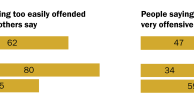
Americans’ views of offensive speech aren’t necessarily clear-cut
About six-in-ten U.S. adults (62%) say that “people being too easily offended by things others say” is a major problem in the country today.
All
Publications
65% of Americans say Hamas bears a lot of responsibility for the current conflict, compared with 35% who say this about the Israeli government.
© 2024 Pew Research Center
